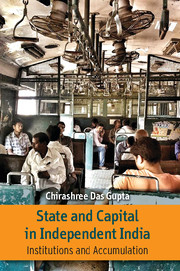Book contents
- Frontmatter
- Dedication
- Contents
- Figures
- Tables
- Acknowledgements
- 1 Introduction
- 2 Globalization and Neoliberalism: The Context and the Debate
- 3 State and Capital in Independent India: The Problematic
- 4 Policy Regimes and Macroeconomic Outcomes: 1947–1966
- 5 Institutionalization of the Regime of Capital in India: 1947–1966
- 6 Continuity and Change in Capital Accumulation: 1966–1980
- 7 Sources of Accumulation: State Intervention and Non-intervention
- 8 ‘Old Oligopolies and New Entrants’ in the Pharmaceutical Sector
- 9 Conclusion
- Bibliography
- Index
2 - Globalization and Neoliberalism: The Context and the Debate
Published online by Cambridge University Press: 05 September 2016
- Frontmatter
- Dedication
- Contents
- Figures
- Tables
- Acknowledgements
- 1 Introduction
- 2 Globalization and Neoliberalism: The Context and the Debate
- 3 State and Capital in Independent India: The Problematic
- 4 Policy Regimes and Macroeconomic Outcomes: 1947–1966
- 5 Institutionalization of the Regime of Capital in India: 1947–1966
- 6 Continuity and Change in Capital Accumulation: 1966–1980
- 7 Sources of Accumulation: State Intervention and Non-intervention
- 8 ‘Old Oligopolies and New Entrants’ in the Pharmaceutical Sector
- 9 Conclusion
- Bibliography
- Index
Summary
This chapter locates the debate on the role of the state in the age of contemporary globalization. The larger debate on globalization has been around the role of two institutions – (1) the state and (2) the market for goods (and services), money and capital, and labour. The dominant understanding of globalization based on the role of these two institutions conceived at this level of abstraction envisages these as competing institutions in which the state has been shown to be ‘distorting’ the workings of the market. This has largely informed the rationale for the deregulation as the path of integration into a globalized world. The case for ‘reforms’ in India from the 1980s has also been premised on this understanding of deregulation and globalization as the means and end, respectively. Critics have contended that this particular convergence is reliant on the ideology of neoliberalism. This ideology of neoliberalism has found its economic rationale in a particular kind of economics that has come to dominate not only the discipline that has birthed and nurtured it but also defined political paradigms of policy making since the 1980s. Critics of the dominant globalization thesis have looked at the phenomenon from a systemic analysis of capitalism in which the two institutions of the state and market have important and distinct roles in the production and circulation of capital, commodities and labour and do not stand as binaries in their role in the capitalist system.
This chapter is divided into five sections. Section 2.1 analyzes the relationship between state and capital in the contending versions of the globalization theses and its relationship with neoliberalism as an ideology. Section 2.2 analyzes the economic rationale for neoliberalism. Section 2.3 examines the political economy of ‘reforms’ in India that was based on a convergence of deregulation with globalization. Section 2.4 summarizes the economic debate on neoliberalism in India. Section 2.6 distills the questions that emerge from these debates in informing the problematic of this book in the form of five propositions.
State and capital in the ‘globalization’ theses
‘Globalization’ has emerged as the dominant political, social and economic paradigm of the current epoch (McChesney, 1998). The ‘globalization thesis’ of the 1980s came after a decade of stagflation in ‘developed’ market economies, structural problems of underdevelopment in developing countries and slowing down of growth rates in the ‘actually existing’ socialist world that was on the verge of collapse.
- Type
- Chapter
- Information
- State and Capital in Independent IndiaInstitutions and Accumulations, pp. 9 - 43Publisher: Cambridge University PressPrint publication year: 2016



